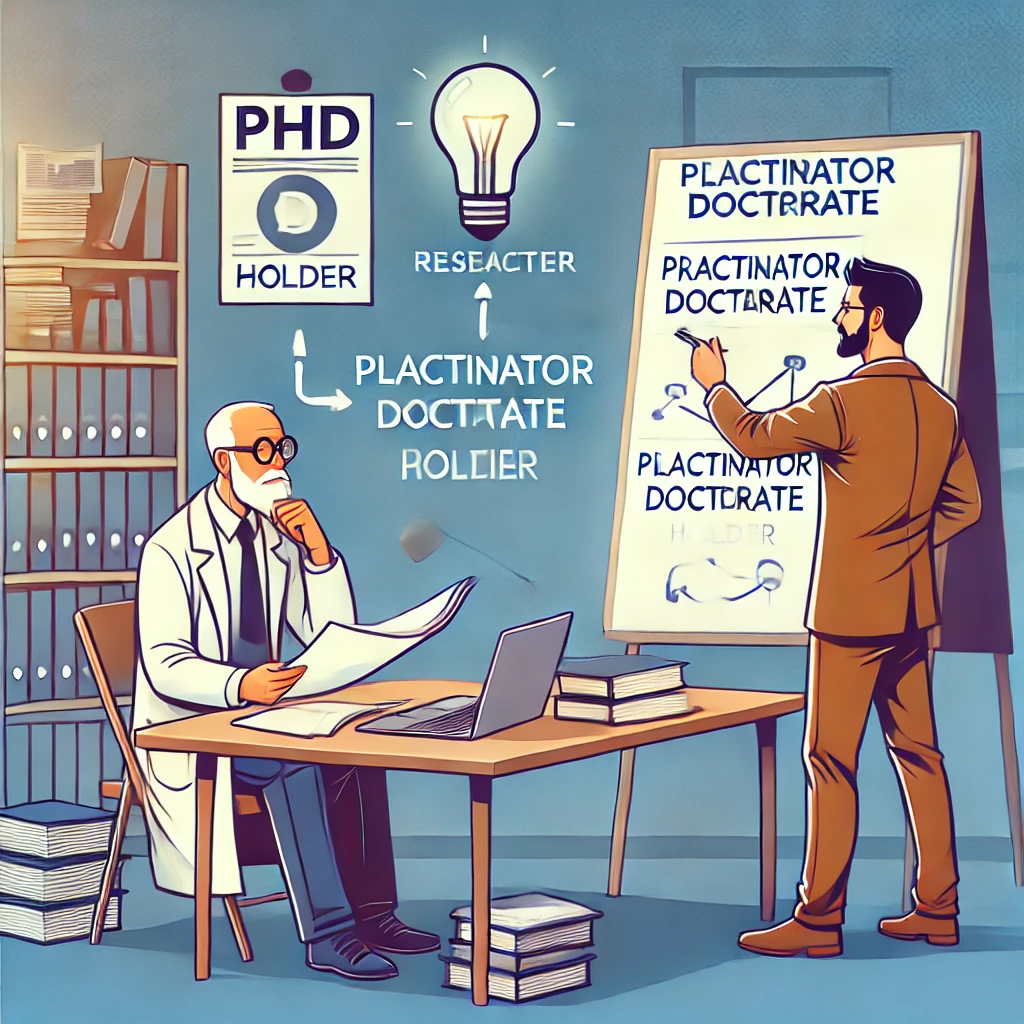As someone with a PhD in Psychology who has worked as a consultant to companies and local governments, I’ve seen firsthand how the roles of PhD holders and practitioner doctorate holders differ in practice. My work involves providing insight into how companies and government actions may affect the public, and this perspective has deepened my understanding of these distinctions. Below, I explore the key differences, offering real-world examples and guidance for those considering either path.
- Focus of Study
- PhD: Focuses on creating new knowledge or theories. For example, a PhD in Psychology might research the impact of social media on mental health, developing new frameworks to understand its effects.
- Practitioner Doctorate: Applies existing knowledge to solve real-world problems. A Doctor of Psychology (PsyD) might use established theories to design a therapy program that helps individuals manage social media addiction.
- Expanded Insight: While I focus on theoretical research to inform public policy, practitioner doctorate holders often work directly with stakeholders to implement these ideas.

- End Goal
- PhD: Primarily aimed at advancing academia or theoretical fields. For example, publishing papers on emerging trends in human behavior.
- Practitioner Doctorate: Geared toward improving professional practice. For instance, a DBA (Doctor of Business Administration) might lead organizational change to improve employee satisfaction.
- Expanded Insight: In my consulting work, I’ve seen practitioner doctorate holders thrive in environments where actionable outcomes are essential.
- Work Environment
- PhD: More likely found in academic settings. For example, teaching at universities or conducting research on behavioral trends.
- Practitioner Doctorate: Found in professional industries. For instance, consulting for businesses to improve customer engagement strategies.
- Expanded Insight: My experience in consulting highlights how both types of doctorate holders bring value to interdisciplinary teams.
- Research Type
- PhD: Conducts exploratory or foundational research, such as studying the psychological effects of urban design on community well-being.
- Practitioner Doctorate: Conducts applied research to address specific issues, like designing programs to enhance urban engagement.
- Expanded Insight: My role often bridges these areas by interpreting theoretical research for practical application.

- Methodology
- PhD: Uses rigorous, often theoretical methodologies. For example, exploring the philosophy of ethics in AI.
- Practitioner Doctorate: Focuses on practical methodologies. For instance, implementing ethical AI systems for public use.
- Expanded Insight: Practitioner doctorate holders often bring the critical step of turning theory into tangible results.
- Career Goals
- PhD: Aims to contribute to academic disciplines, such as writing a book on behavioral economics.
- Practitioner Doctorate: Seeks to influence industry standards, like creating economic policies for local governments.
- Expanded Insight: My career in consulting reflects the PhD’s focus on long-term societal impact, while I’ve collaborated with practitioner doctorate holders on immediate implementations.
- Audience
- PhD: Writes for an academic audience, publishing in specialized journals.
- Practitioner Doctorate: Produces work aimed at practitioners, such as policy briefs for government agencies.
- Expanded Insight: Balancing both types of audiences has been crucial in my consulting role, requiring adaptability in communication.
- Program Design
- PhD: Focuses on long-term, deep exploration of a single topic, such as spending years analyzing cultural responses to technology.
- Practitioner Doctorate: Designed for working professionals, often shorter and project-oriented. For instance, completing a capstone project to improve corporate logistics.
- Expanded Insight: Practitioner programs’ flexibility makes them ideal for those already entrenched in their careers.
- Collaboration
- PhD: Often works independently. For instance, presenting solo at conferences.
- Practitioner Doctorate: Regularly collaborates with teams, such as partnering with businesses to implement behavioral strategies.
- Expanded Insight: Collaboration has been vital in my role, blending theoretical insights with practical teamwork.

- Impact
- PhD: Aims for long-term societal or intellectual impact, such as influencing future generations of scholars.
- Practitioner Doctorate: Aims for immediate, tangible results, like improving patient outcomes in healthcare.
- Expanded Insight: Both types of impact are essential; my work often involves predicting long-term effects while aiding short-term decision-making.
Real-Life Stories
In my consulting career, I’ve collaborated with both PhD holders and practitioner doctorate holders. One memorable project involved working with a Doctor of Public Administration (DPA) to implement a community outreach program. While I provided the theoretical basis on behavioral psychology, the DPA translated these concepts into actionable steps, creating immediate community benefits.
Data and Statistics
Statistics reveal the complementary roles of these degrees. For instance, a 2023 study showed that PhD holders often secure academic or research roles (75%), while practitioner doctorate holders dominate leadership and applied fields (80%).
Historical Context
The origins of PhD programs trace back to medieval universities, emphasizing intellectual exploration. Practitioner doctorates, emerging more recently, reflect the growing need for expertise in dynamic professional contexts.
Decision-Making Factors
Choosing between a PhD and a practitioner doctorate depends on your career aspirations:
- If you’re drawn to academia, theory, or long-term societal contributions, a PhD may be the right fit.
- If you prefer hands-on leadership or solving immediate challenges, a practitioner doctorate could be your path.
The Takeaways
Both PhDs and practitioner doctorate holders play indispensable roles in shaping our world. As someone who bridges theory and practice, I’ve found immense value in collaborating with professionals from both backgrounds to address complex challenges and drive meaningful change.

